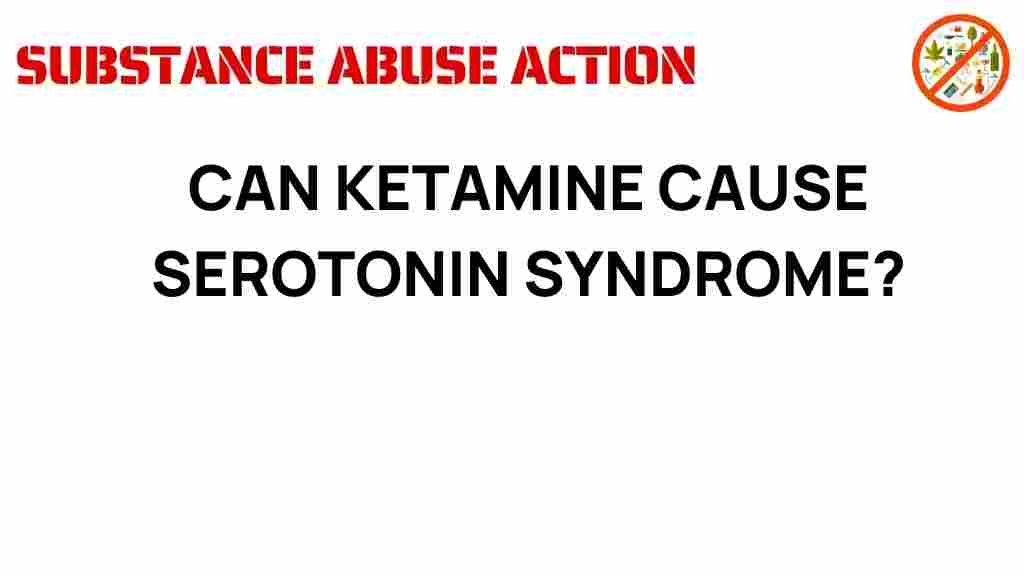Can Ketamine Be a Hidden Risk for Serotonin Syndrome?
In recent years, ketamine has gained attention as a rapid treatment option for various mental health disorders, particularly depression and anxiety. While its efficacy is promising, it is essential to scrutinize its safety profile, especially concerning serotonin syndrome. This article explores the relationship between ketamine and serotonin syndrome, highlighting the risks involved in their interaction and offering insights into safe treatment practices.
Understanding Ketamine
Ketamine is a dissociative anesthetic that has been used in medical settings since the 1960s. Recently, it has emerged as a potential treatment for mental health conditions such as:
- Major depressive disorder
- Post-traumatic stress disorder (PTSD)
- Generalized anxiety disorder
- Obsessive-compulsive disorder (OCD)
Ketamine works by acting on the NMDA receptor in the brain, resulting in a rapid antidepressant effect, often within hours. This is a significant contrast to traditional antidepressants, which can take weeks to show effects. However, the rapid action of ketamine also raises questions about its safety and potential for adverse effects, particularly serotonin syndrome.
What is Serotonin Syndrome?
Serotonin syndrome is a potentially life-threatening condition that occurs when there is an excess of serotonin in the brain. It can result from the use of certain drugs, particularly those that increase serotonin levels, such as:
- Selective serotonin reuptake inhibitors (SSRIs)
- Serotonin-norepinephrine reuptake inhibitors (SNRIs)
- Monoamine oxidase inhibitors (MAOIs)
- Certain recreational drugs
Symptoms of serotonin syndrome can range from mild to severe and may include:
- Agitation
- Confusion
- Rapid heart rate
- Elevated blood pressure
- Increased body temperature
- Tremors and muscle rigidity
If left untreated, serotonin syndrome can lead to serious complications, including seizures, brain damage, or even death. Recognizing the signs early and seeking immediate medical attention is crucial.
Can Ketamine Trigger Serotonin Syndrome?
While ketamine is not primarily known to increase serotonin levels, there is growing concern about its potential to interact with other medications that do. Patients who are undergoing treatment with ketamine often have a history of mental health disorders and may be prescribed other serotonergic medications. This combination raises the stakes for the development of serotonin syndrome.
Factors Contributing to Serotonin Syndrome Risk
Several factors can increase the risk of developing serotonin syndrome when using ketamine:
- Combination with Serotonergic Medications: Using ketamine alongside SSRIs, SNRIs, or other serotonergic drugs can raise serotonin levels dangerously.
- High Doses of Ketamine: Higher doses of ketamine may have more pronounced effects on the serotonin system.
- Individual Variation: Each person’s metabolism and response to drugs can vary significantly, affecting how they process ketamine and other medications.
- Substance Abuse: Patients with a history of addiction may be more likely to misuse medications, increasing the likelihood of serotonin syndrome.
Step-by-Step Process for Safe Ketamine Treatment
To minimize the risk of serotonin syndrome while using ketamine for treatment, consider the following steps:
- Comprehensive Assessment: Before starting ketamine treatment, ensure thorough evaluation of the patient’s medication history, including any use of SSRIs or other serotonergic drugs.
- Monitor Dosage: Begin with the lowest effective dose of ketamine and monitor the patient closely for any adverse effects.
- Regular Follow-ups: Schedule regular follow-ups to assess the patient’s response to ketamine and any other medications they may be taking.
- Educate Patients: Inform patients about the signs and symptoms of serotonin syndrome and encourage them to report any unusual changes in their condition.
- Avoid Polypharmacy: Where possible, simplify the medication regimen to reduce the risk of interactions.
Troubleshooting Tips for Patients
If you are undergoing ketamine treatment and are concerned about serotonin syndrome, consider the following troubleshooting tips:
- Stay Informed: Understand the medications you are taking and their potential interactions with ketamine.
- Communicate Openly: Maintain open communication with your healthcare provider about all medications, supplements, and recreational drugs you are using.
- Monitor Symptoms: Keep track of any new or worsening symptoms and report them to your doctor immediately.
- Emergency Plan: Have a plan in place for emergencies, including knowing when to seek immediate medical help.
Conclusion
While ketamine presents a promising avenue for treating anxiety, depression, and other mental health disorders, it is crucial to remain vigilant about the potential risks associated with its use, particularly serotonin syndrome. By understanding the interplay between ketamine and serotonergic medications, patients and healthcare providers can work together to minimize risks and optimize treatment outcomes.
As mental health treatments continue to evolve, ongoing research and education will be vital in ensuring that patients receive safe and effective care. If you or someone you know is considering ketamine treatment, consult a qualified healthcare professional to discuss the potential risks and benefits.
For more information on mental health treatments and recovery strategies, visit this resource.
Additionally, if you or someone you know is struggling with addiction, consider reaching out for support through local services or national hotlines. Help is available, and recovery is possible.
In summary, while ketamine can be a valuable tool in the treatment of mental health conditions, awareness and caution regarding serotonin syndrome are essential for ensuring patient safety and promoting successful outcomes.
This article is in the category Treatment and created by SubstanceAbuseAction Team
